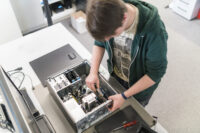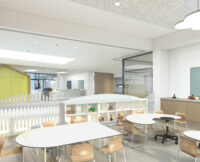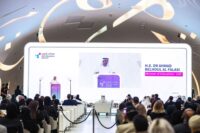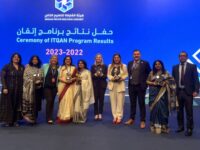Alef Education and MetaMetrics collaborate to build Lexile-Powered, Arabic scale to provide native Arabic speaking students with a tool to improve their literacy in the language
Abu Dhabi, Feb 6, 2024: A strategic collaboration will see the launch of an Arabic reading scale that is set to improve the literacy skills of approximately 100 million K-12 Arabic speaking students across the Middle East and North Africa (MENA) region. Alef Education, a UAE-based education technology company, is collaborating with MetaMetrics, the US-based developer of the Lexile® Framework for Reading, to launch the Arabic reading scale.
The initiative aims to provide students across the MENA region with the foundational skills they need for academic success and lifelong learning. The Arabic reading scale measures the level of text and the Arabic reading ability of a student and provides a universal unit of measurement for the Arabic language.
The benefits of an Arabic reading scale include the ability for governments to identify and measure students’ reading levels and progress over time, regardless of the reading materials used, by comparing geographic regions and individual schools using the same scale. In addition, publishers, EdTech companies and authors of Arabic language content will be able to link their reading materials and assessments to the unified scale to meet learners’ needs for reading materials.
A statement by Alef Education says that the reading scale would make it easier for teachers to measure their students’ levels and create data-driven plans for their individual development, and for parents to understand their children’s reading levels so that they can further develop and improve their reading skills.
Recent data from the Program for International Student Assessment (PISA) shows that six Arab countries scored an average of 406 points in their PISA exams, while the international OECD average is 480. The Trends in International Mathematics and Science Study (TIMSS) shows that eight Arab countries scored an average of 432 points in elementary school and 441 points in secondary school, while the global average is 500. The Progress in International Reading Literacy Study (PIRLS) shows that seven Arab countries scored an average of 441, while the worldwide average is 500. The Alef Education statement says that there is a need for a reimagined solution, an Arabic reading scale powered by the Lexile scale, which will serve as the foundation for a unified ecosystem of assessments and instructional resources.
Geoffrey Alphonso, CEO of Alef Education says“The development of an Arabic reading scale with a universal framework to measure the level of students and Arabic texts will support student growth in Arabic language learning through actionable learning measurements.”
Alistair Van Moere, President of MetaMetrics says, “We aim to promote equity and excellence in education and accelerate learning for all students by providing innovative reading and assessment scales to improve teaching and learning standards.”
The Arabic reading scale is scientifically based and will be developed by a team of psychometricians, researchers, and educators who have extensive experience developing similar scales and understand the unique context of the Arab world, including its various dialects and cultural nuances. A field study is being conducted across the Arab world in consultation with governments in the region.








